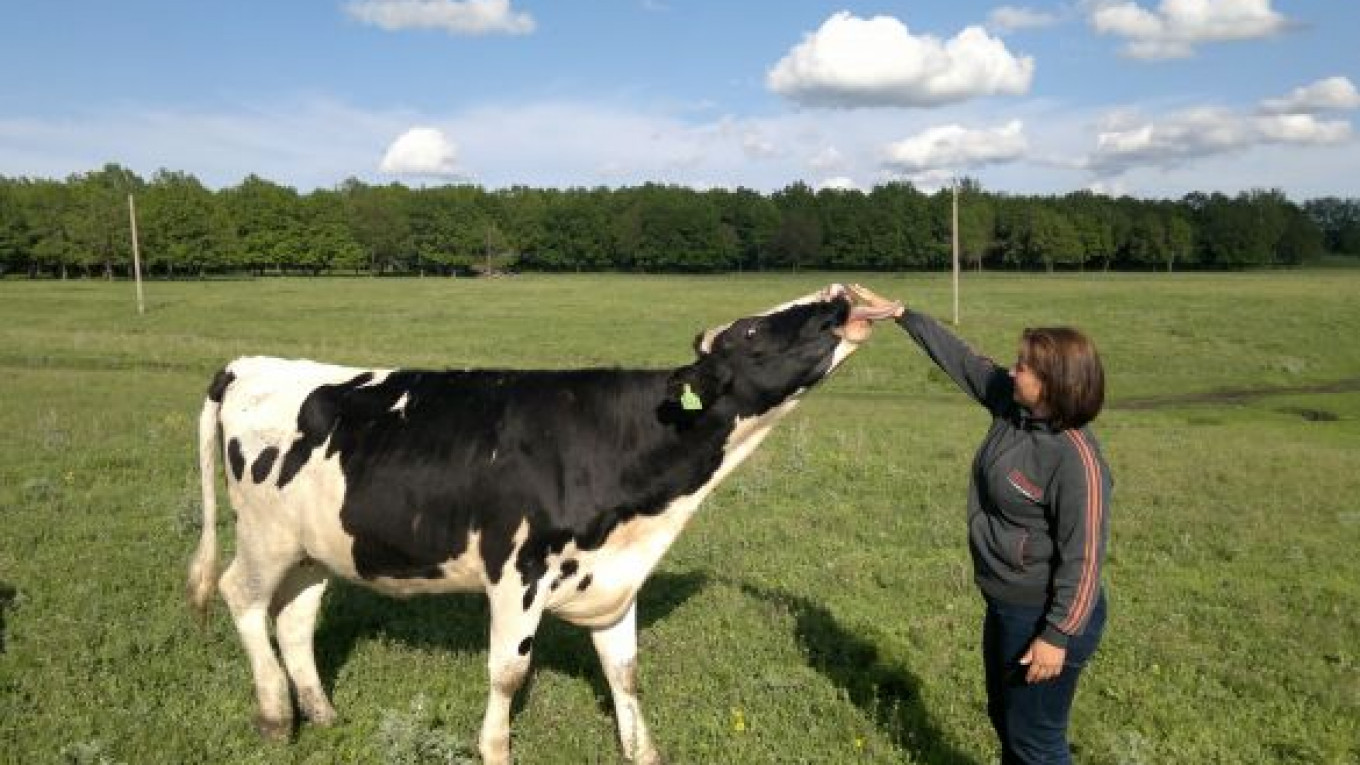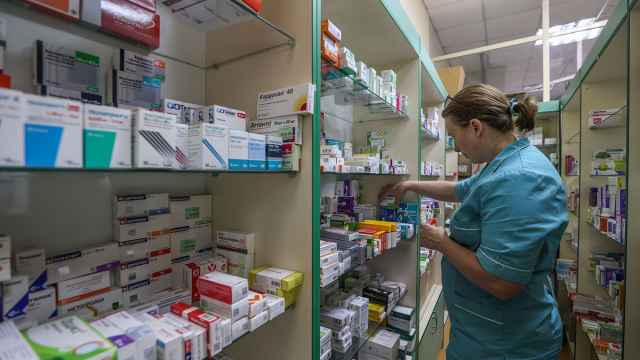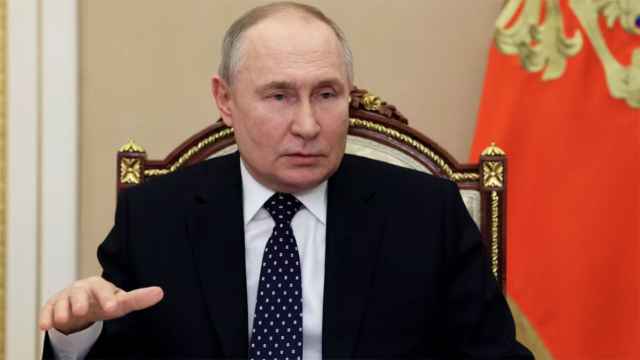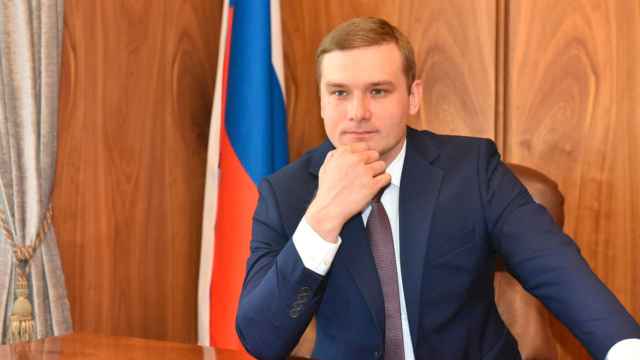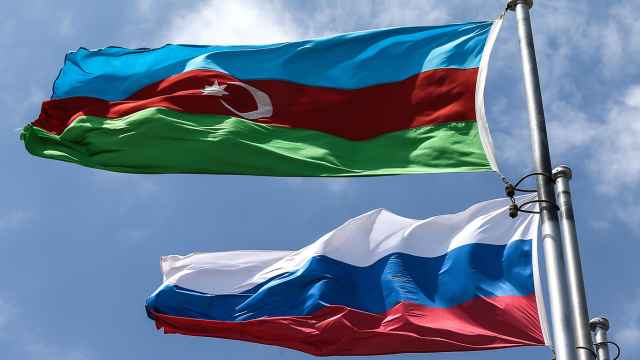KARMASKALINSKY DISTRICT, Bashkortostan — Artur Nurgaliyev pointed to a group of black-and-white spotted cows feeding out of a trough on his farm near Ufa, the capital of Bashkortostan.
“You pick a good cow from behind, not by the eyes,” he said.
Nurgaliyev, 37, is a pioneer of high-tech dairy farming in Bashkortostan and a model for the regional government’s multimillion-dollar project to quintuple the sector by 2016.
He bought the modestly sized 5-hectare farm five years ago. Before that he sold sugar. When sugar prices jumped from 15 rubles to 25 rubles a kilogram in 2006, Nurgaliyev thought he should grow sugar, not just sell it. He bought the land and planted the beets. Then he got “sucked in” and bought cows, and began to grow grain in addition to the beets, he said.
Today the farm is one of the most technologically advanced in the region. The farm has special milking equipment that can accommodate a breed of cows that produces more milk. A regular cow produces about 8 liters a day, while Nurgaliyev’s cows produce 22.
Six cows can be milked at a time with the German-made Yelochka system that cost Nurgaliyev 7 million rubles ($219,000). The milk passes through tubes to a cooler in the next room that can hold up to 5 tons of milk. A truck then comes to pick up the milk for processing.
A special computer program connected to the milking device tracks each cow’s milk output, age and other biographical data.
Nurgaliyev’s 200 cows produce up to 3 tons of milk daily, making him about 9,000 rubles per day. While most of the money is spent on animal feed and salaries, milk production is a profitable business, said Farit Samyekhov, a senior official in Bashkortostan’s Agriculture Ministry.
Over the next five years, the Bashkortostan government plans to spend up to 17.5 billion rubles to add new dairy farms and modernize old ones at a rate of 100 per year.
The overhaul is part of a nationwide effort to increase milk production. Some 300 million rubles will come from the federal budget of 18 billion rubles, aimed at increasing milk production in the country.
The majority of the republic’s existing dairy farms use Soviet-era equipment, and most milking is still done by hand into buckets, Samyekhov said.
“We do everything the old way here,” Samyekhov said.
Despite the lack of modern equipment, Bashkortostan leads the country in milk production. The region’s dairy farms produced 1.24 million tons of milk in the first eight months of 2011. But the republic is ambitious. After the program is completed in 2016, milk production should increase by at least 1 1/2 times, Samyekhov said.
The farms provide the republic’s milk needs as well as dairy exports to other parts of the country.
Taxes from all agricultural business will contribute about 1 billion rubles to the republic’s budget this year, said deputy finance minister of Bashkortostan Alexander Maryin. Next year, the republic hopes to get 2.5 billion rubles in taxes from farms.
But it will take a lot of work, Nurgaliyev said. The region’s agriculture sector is riddled with problems.
Nurgaliyev’s farm employs 11 to 13 people, depending on the season. The jobs pay an average salary of 15,000 rubles per month, higher than in many regions in Russia. But Nurgaliyev does not see workers lined up at his door. One reason is that there is no housing anywhere near the farm. Nurgaliyev recently hired a veterinarian from another town. She has to live in a dormitory in the nearby village, he said.
Other issues include nonpayment of insurance claims and promised government subsidies, and unclear land-lease terms, Nurgaliyev said.
But the biggest problem is the lack of cooperation between government and the farms and a lack of skilled managers that know how to take advantage of the resources, Nurgaliyev said.
Investing in milk and meat production and beet and grain cultivation would create new jobs and be profitable for both investors and the republic, said Aidar Garyev, head of Bashkortostan Development Corporation.
Although some investment has come into the region’s agricultural sector — Jordan-based Alrai Group Holding will build an $865 million wheat processing complex that will use biotechnologies — investors with business know-how are badly needed in the republic, Nurgaliyev said.
“We are ready to do anything — grow medicinal plants, spices — the earth here is good,” Nurgaliyev said.
A Message from The Moscow Times:
Dear readers,
We are facing unprecedented challenges. Russia's Prosecutor General's Office has designated The Moscow Times as an "undesirable" organization, criminalizing our work and putting our staff at risk of prosecution. This follows our earlier unjust labeling as a "foreign agent."
These actions are direct attempts to silence independent journalism in Russia. The authorities claim our work "discredits the decisions of the Russian leadership." We see things differently: we strive to provide accurate, unbiased reporting on Russia.
We, the journalists of The Moscow Times, refuse to be silenced. But to continue our work, we need your help.
Your support, no matter how small, makes a world of difference. If you can, please support us monthly starting from just $2. It's quick to set up, and every contribution makes a significant impact.
By supporting The Moscow Times, you're defending open, independent journalism in the face of repression. Thank you for standing with us.
Remind me later.


